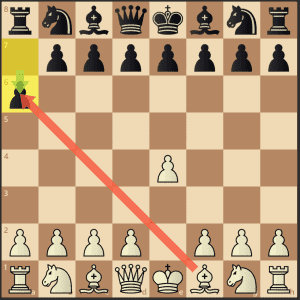Now that we've talked about develop parts, attack well and save your king, it's time to talk about this topic: DO NOT make moves whose sole purpose is to make your opponent fall into that trap..
At very low levels, chess can be understood as the art of making your opponent fall into your traps and ambushes, but without a doubt, it goes much further than that; Hence my intention with this very basic advice is to try to solve these types of thoughts.
Post content:
What do I mean?
I want to give you a real example, where a boy who was starting to play chess made, with the black pieces, the pawn move that you see below.

His plan was that if his opponent tried to capture the pawn with the only piece that could do so, he would then capture his opponent's bishop, and win.
If the opponent does not take the bait, and decides to continue developing pieces, he can obtain a very comfortable position in just a few more moves.
It seems like a very silly example, but it's what happens every time you make a move tempting your opponent to make a mistake. That's why this advice is: «Avoid movements whose only so that your rival falls into that trap«.
So a movement interesting It may be one that has a primary purpose and whose secondary function is to tempt the opponent to make a mistake. It's up to you to evaluate whether that primary purpose is really that important, or whether you're mistakenly motivated by watching your rival fall into that trap.
Because it is important?
If you want to finish a game very quickly, you will have to take more risks.
Trying to make your opponent fall for some tactical trick can be a wild card to try to save a game that has little future; On the other hand, if you are the one who has the advantage, your best option will always be to play solid, put pressure and end up prevailing.
If you have a bit of an advantage and you continue to always make the best move, it is inevitable that you will end up winning, which is why it is important that you do not make double-edged moves.
How to avoid it?
Avoiding making these types of mistakes is very simple: just think of variations in which your opponent does not take the bait and ask yourself "Have I achieved something or have I simply lost a move?"
Summary
Tempting your opponent to make a mistake can be interesting in a game where you are losing, or perhaps it can also be interesting if you think it is the best or second best move, but always ask yourself if it will be a good move even if your opponent does not fall in the trap.
Here ends the explanation of «Avoid moves whose sole purpose is to make your opponent fall into that trap».
Can return to index of these chess tips and concepts by clicking here.
